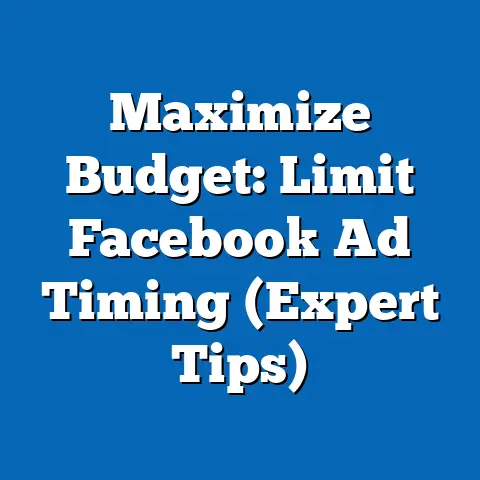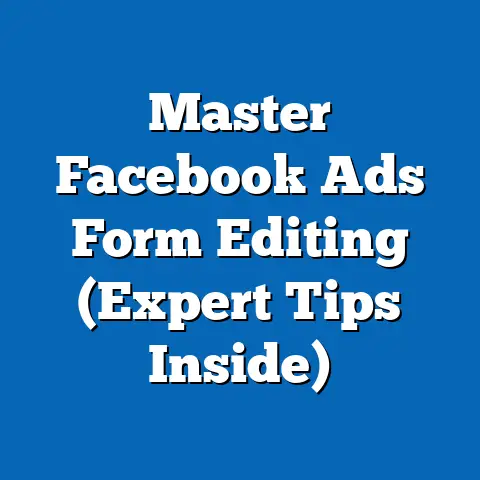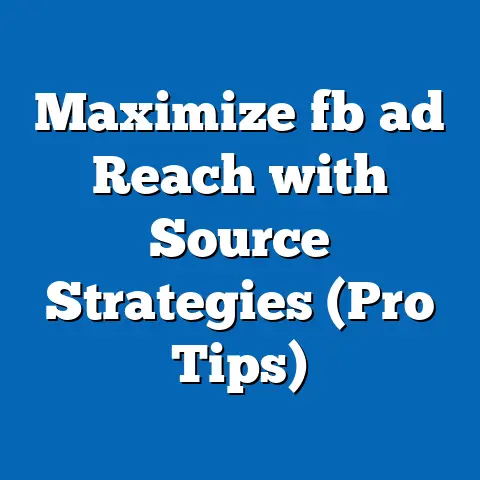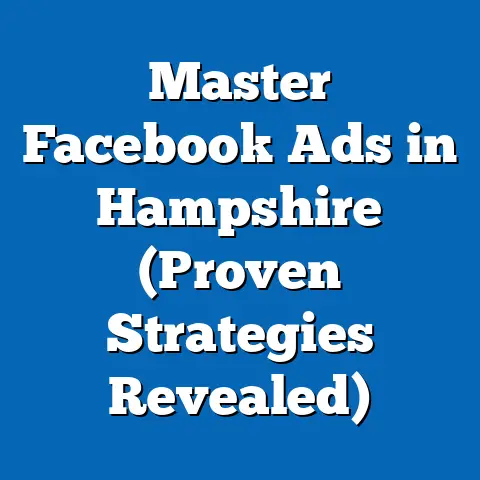Why Are Facebook Ads the Only Game in Town? (Expert Analysis)
Introduction: The Humor Hook
Let me tell you a story about a local soap maker named Agnes. Agnes was a master of her craft. She whipped up the most luxurious, fragrant soaps you could imagine – lavender dreams, citrus bursts, even a quirky bacon-scented bar (don’t ask!). Agnes, bless her heart, wasn’t exactly tech-savvy. When it came time to advertise, she figured the best way to reach her target audience was the old-fashioned way: carrier pigeons. Yes, you read that right. She attached tiny flyers to the legs of her feathered friends and sent them soaring across town.
The result? Well, let’s just say the pigeons were more interested in finding breadcrumbs than delivering marketing messages. And Agnes quickly learned that while her soaps were a hit, her advertising strategy was… a flop.
The moral of Agnes’s story? In today’s world, you can’t rely on carrier pigeons (or most traditional marketing methods) to get your message across. That’s where Facebook ads come in. While there might be other options out there, Facebook ads are undeniably a powerful and effective tool for marketers. So, let’s find out why!
Section 1: The Landscape of Digital Advertising
To truly understand why Facebook ads hold such a dominant position, we need to take a stroll down memory lane and explore the evolution of digital advertising.
From Banners to Behemoths: A Brief History
Remember those early days of the internet? Flashing banner ads screaming at you to “Click Here!” It was the Wild West of digital marketing. Over time, things got a little more sophisticated. Search engines emerged, and with them, came the rise of pay-per-click (PPC) advertising, pioneered by Google Ads.
As social media platforms blossomed, they too saw the potential for advertising revenue. MySpace, LinkedIn, and eventually Facebook entered the arena, each offering unique ways to connect businesses with potential customers.
The Players in the Game: Google Ads, Instagram, LinkedIn, and More
Let’s take a quick look at some of the key players in the digital advertising ecosystem:
- Google Ads: The undisputed king of search engine marketing. Perfect for reaching users actively searching for specific products or services. Think of it as the yellow pages of the internet, but on steroids.
- Instagram: The visual powerhouse. Ideal for brands with strong aesthetics and a focus on influencer marketing. It’s where you go to drool over perfectly curated lifestyles and discover the latest trends.
- LinkedIn: The professional networking giant. Great for B2B marketing and reaching professionals in specific industries. If you’re selling enterprise software, LinkedIn is your playground.
- Twitter/X: A real-time news and information platform. Can be used for quick updates, engaging with current events, and customer service.
- TikTok: The short-form video sensation. Perfect for reaching Gen Z and creating viral content. If you can nail a catchy dance trend, TikTok is your goldmine.
Why Facebook Ads Reign Supreme
So, with all these options, why do Facebook ads often feel like the only game in town? Here’s a breakdown:
- Massive User Base: Facebook boasts billions of active users worldwide. That’s a huge pool of potential customers just waiting to be reached.
- Unparalleled Targeting Capabilities: Facebook’s data collection is legendary (and sometimes controversial, which we’ll get to later). This allows advertisers to target incredibly specific demographics, interests, and behaviors.
- High Engagement Rates: Facebook users spend a significant amount of time on the platform, scrolling through their feeds and engaging with content. This creates ample opportunities for ads to grab their attention.
- Versatile Ad Formats: From image ads to video ads to carousel ads, Facebook offers a wide range of ad formats to suit different marketing objectives and creative styles.
- Measurable Results: Facebook’s Ads Manager provides detailed analytics on ad performance, allowing advertisers to track their ROI and make data-driven decisions.
As Neil Patel, a renowned digital marketing expert, once said, “Facebook advertising is the most cost-effective way to reach your target audience online.” While I might not agree that it’s the only way, it’s certainly a strong contender.
Takeaway: The digital advertising landscape is diverse, but Facebook ads stand out due to their massive user base, advanced targeting, high engagement rates, versatile ad formats, and measurable results.
Section 2: Facebook’s Unique Selling Propositions
Let’s delve deeper into what makes Facebook ads so special. It’s not just about having a large audience; it’s about how you can connect with that audience in a meaningful way.
Targeting Nirvana: Demographics, Interests, Behaviors, and Custom Audiences
Facebook’s targeting options are the stuff of marketing dreams (and sometimes, privacy nightmares). Here’s a glimpse of what you can do:
- Demographics: Target users based on age, gender, location, education, relationship status, and more. Want to reach single women in their 30s who live in New York City? Facebook can do that.
- Interests: Target users based on their hobbies, passions, and the pages they like. Are you selling hiking gear? Target users who like hiking, camping, and outdoor adventure pages.
- Behaviors: Target users based on their online activity, purchase history, and device usage. Want to reach people who frequently travel internationally? Facebook has you covered.
- Custom Audiences: This is where things get really interesting. You can upload your own customer lists (email addresses, phone numbers) and target those specific individuals on Facebook. You can also create “lookalike audiences” – users who share similar characteristics with your existing customers.
I once ran a campaign for a local bakery that wanted to promote their new line of gluten-free pastries. Using Facebook’s targeting, we were able to reach users who had expressed interest in gluten-free diets, health and wellness, and even specific gluten-free brands. The results were phenomenal – the bakery saw a significant increase in sales of their gluten-free treats.
The Algorithm’s Magic: Optimizing Ad Placements
Facebook’s algorithm is a mysterious beast, constantly learning and adapting to user behavior. It analyzes thousands of data points to determine which ads are most relevant to each individual user. This means that your ads are more likely to be shown to people who are actually interested in what you have to offer.
The algorithm also optimizes ad placements, showing your ads in the most effective locations (e.g., news feed, right column, Instagram feed). It takes into account factors like ad format, user engagement, and bidding strategy to maximize your ROI.
Data is King: How Facebook’s Data Collection Benefits Advertisers
Let’s not sugarcoat it: Facebook collects a lot of data. Every like, share, comment, and click is tracked and analyzed. While this raises privacy concerns (which we’ll address later), it also provides advertisers with invaluable insights into user behavior.
This data allows advertisers to:
- Create more targeted ads: By understanding what users are interested in, advertisers can create ads that are more relevant and engaging.
- Optimize ad campaigns: By tracking ad performance, advertisers can identify what’s working and what’s not, and make adjustments accordingly.
- Personalize the user experience: By understanding user preferences, advertisers can create personalized ads that resonate with individual users.
Case Studies: Success Stories from the Facebook Ad Frontlines
Let’s take a look at a couple of real-world examples of successful Facebook ad campaigns:
- Dollar Shave Club: This subscription-based razor company used Facebook ads to create a viral video that poked fun at traditional razor commercials. The video was hilarious, relatable, and perfectly targeted to their target audience (men who were tired of overpriced razors). The campaign resulted in a massive influx of new subscribers and helped Dollar Shave Club become a household name.
- Airbnb: This home-sharing platform used Facebook ads to target travelers based on their interests, travel destinations, and budget. They also used custom audiences to re-engage users who had previously visited their website. The campaign helped Airbnb increase bookings and expand its global reach.
Takeaway: Facebook’s unique selling propositions include its unparalleled targeting options, advanced algorithm, vast data collection, and proven track record of success.
Section 3: The Psychology Behind Facebook Ads
It’s not enough to simply target the right audience; you also need to understand what makes them tick. Let’s explore the psychological factors that contribute to the effectiveness of Facebook ads.
Visual Content: Grabbing Attention in a Scroll-Happy World
In a world of endless scrolling, visual content is king. Images and videos are far more likely to grab a user’s attention than text alone. That’s why it’s crucial to invest in high-quality visuals that are both eye-catching and relevant to your target audience.
Think about it – what are you more likely to click on: a blurry photo of a product or a professionally shot video showcasing its features? The answer is obvious.
Storytelling: Connecting with Users on an Emotional Level
People are drawn to stories. They evoke emotions, create connections, and make information more memorable. That’s why storytelling is such a powerful tool in advertising.
Instead of simply listing the features of your product, tell a story about how it solves a problem or improves someone’s life. Make your audience feel something – whether it’s joy, excitement, or even a little bit of sadness.
Social Proof: Leveraging the Power of Peer Influence
People are more likely to trust recommendations from their friends and family than they are from advertisements. That’s why social proof is so effective.
Incorporate social proof into your Facebook ads by:
- Displaying customer testimonials: Let your satisfied customers speak for you.
- Showcasing user-generated content: Feature photos and videos of your customers using your products.
- Highlighting positive reviews: Share screenshots of positive reviews from Yelp, Google, or other review sites.
FOMO and Urgency: Driving Conversions with Limited-Time Offers
The fear of missing out (FOMO) is a powerful motivator. People don’t want to be left behind or miss out on a great deal. That’s why limited-time offers and urgency tactics can be so effective in driving conversions.
Create a sense of urgency by:
- Offering a limited-time discount: “Get 20% off your first order – offer ends tonight!”
- Highlighting limited availability: “Only 10 spots left!”
- Creating a countdown timer: Show users how much time they have left to take advantage of the offer.
As Dr. Robert Cialdini, author of “Influence: The Psychology of Persuasion,” explains, “People are more motivated to take action when they perceive something as scarce or limited.”
Takeaway: The psychology behind Facebook ads involves leveraging visual content, storytelling, social proof, and FOMO to connect with users on an emotional level and drive conversions.
Section 4: Challenges and Criticisms of Facebook Ads
Let’s be real – Facebook advertising isn’t all sunshine and rainbows. There are definitely challenges and criticisms that need to be addressed.
Ad Fatigue: Keeping Your Content Fresh and Engaging
Ad fatigue is a real problem. Users get tired of seeing the same ads over and over again. That’s why it’s crucial to keep your content fresh and engaging.
- Rotate your ads frequently: Don’t let your ads get stale.
- Experiment with different ad formats: Try out different images, videos, and headlines.
- Target different audiences: Reach new users who haven’t seen your ads before.
Privacy Concerns: Navigating the Ethical Minefield
Facebook’s data collection practices have been the subject of intense scrutiny in recent years. Users are increasingly concerned about how their data is being used and shared.
As an advertiser, it’s your responsibility to respect user privacy and be transparent about your data collection practices.
- Comply with all relevant privacy regulations: GDPR, CCPA, and other privacy laws.
- Be transparent about your data collection practices: Explain how you’re using user data to target ads.
- Give users control over their data: Allow users to opt out of targeted advertising.
Algorithm Changes: Adapting to the Ever-Shifting Landscape
Facebook’s algorithm is constantly changing. What worked yesterday might not work today. That’s why it’s crucial to stay up-to-date on the latest algorithm changes and adapt your strategies accordingly.
- Follow industry blogs and publications: Stay informed about the latest news and trends in Facebook advertising.
- Experiment with new features and strategies: Don’t be afraid to try new things.
- Monitor your ad performance closely: Track your ROI and make adjustments as needed.
In the words of digital marketing strategist, Amy Porterfield, “The only constant in social media is change. You have to be willing to adapt and evolve to stay ahead of the curve.”
Takeaway: Challenges and criticisms of Facebook ads include ad fatigue, privacy concerns, and algorithm changes. It’s crucial to address these challenges by keeping your content fresh, respecting user privacy, and staying up-to-date on the latest trends.
Section 5: The Future of Facebook Advertising
So, what does the future hold for Facebook advertising? Let’s gaze into our crystal ball and make some predictions.
AR/VR: Immersive Advertising Experiences
Augmented reality (AR) and virtual reality (VR) are poised to revolutionize the way we experience advertising. Imagine being able to try on clothes virtually before you buy them, or take a virtual tour of a vacation destination.
Facebook is already investing heavily in AR/VR technologies. It’s only a matter of time before we see more immersive advertising experiences on the platform.
AI Advancements: Hyper-Personalized Advertising
Artificial intelligence (AI) is already playing a significant role in Facebook advertising. AI-powered algorithms are used to optimize ad placements, target audiences, and personalize the user experience.
In the future, AI will become even more sophisticated, allowing advertisers to create hyper-personalized ads that are tailored to the individual needs and preferences of each user.
Changes in Consumer Behavior: The Rise of Conscious Consumption
Consumers are becoming more conscious of their spending habits and the impact of their purchases on the environment and society. They’re increasingly looking for brands that align with their values.
Advertisers will need to adapt to this shift by creating ads that are authentic, transparent, and socially responsible.
The Potential Impact of Competitor Platforms and Regulatory Changes
Facebook faces increasing competition from other social media platforms, such as TikTok and Snapchat. These platforms are attracting younger users and offering new and innovative advertising formats.
Facebook also faces increasing regulatory pressure from governments around the world. New privacy laws and antitrust regulations could significantly impact Facebook’s advertising model.
Despite these challenges, I believe that Facebook will remain a dominant player in the digital advertising landscape for the foreseeable future. Its massive user base, advanced targeting capabilities, and ongoing investments in innovation will continue to give it a competitive edge.
As futurist and author, Ray Kurzweil, once said, “Technology is a double-edged sword. It can be used for good or for evil. It’s up to us to choose how we use it.”
Takeaway: The future of Facebook advertising will be shaped by emerging trends such as AR/VR, AI advancements, changes in consumer behavior, and the potential impact of competitor platforms and regulatory changes.
Conclusion: Wrapping Up with a Humorous Twist
So, there you have it – a deep dive into the world of Facebook ads. We’ve explored its strengths, weaknesses, and the challenges it faces. We’ve even taken a peek into the future to see what lies ahead.
Remember Agnes, the soap maker with the carrier pigeons? Well, maybe one day she’ll be able to launch her soaps into space on a rocket ship, targeting aliens with a craving for lavender-scented goodness. But until then, she’s sticking with Facebook ads.
While other advertising options exist, Facebook ads are undeniably a powerful and effective tool for marketers. They offer unparalleled targeting capabilities, high engagement rates, and measurable results. So, whether you’re selling soap, software, or spaceships, Facebook ads are a game you can’t afford to ignore.
Now, go forth and conquer the Facebook ad world! Just remember to keep your content fresh, respect user privacy, and stay up-to-date on the latest trends. And who knows, maybe one day you’ll be telling your own story about the absurdities of advertising before Facebook came along.






